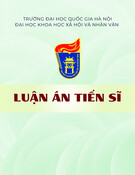
HO CHI MINH NATIONAL ACADEMY OF POLITICS
DO VAN DUONG
IMPLEMENTATION OF LAW ON DEMOCRACY IN COMMUNES,
WARDS, TOWNS OF THE CENTRAL HIGHLANDS
Specialisation : Theory and History of State and Law
Code : 62 38 01 01
SUMMARY OF PHILOSOPHY OF LAW DOCTOR’S THESIS
HA NOI - 2014

The work was completed at Ho Chi Minh National Academy of
Politics
Thesis supervisor:Ass Prof. Dr.Trinh Duc Thao
Reviewer 1:
Reviewer 2:
Reviewer 3:
.
The thesis will be defended before the Board of Ho Chi Minh
National Academy of Politics
At…: On ..... ...... ...... May 2014
The thesis can be found for study at the National Library and the
Library of Ho Chi Minh National Academy of Politics

INTRODUCTION
1. Rationales
Central Highlands is an important area in terms of socioeconomic and
strategic status, defense, security and ecological environment. After many
years of legal implementation of democracy in communes, wards and towns,
it has achieved initial comprehensive success but is also facing difficulties
and challenges due to the negative impact of market mechanisms,
international economic integration, the limitations and weaknesses in the
leadership and management of a number of Party committees and local
governments. A number of party members and civil servants are still not fully
aware of democracy law. The violation and hindrance of democracy law
implementation has occurred. In some communes, especially ones in remote
and ethnic minority areas, the implementation has not been carried out
consistently and regularly, failing to meet the requirements of new tasks.
In some cases, civil servants have also overlooked or avoided dealing
with the concerns of people due to lack of accountability. The policy “people
know, people discuss, people do” has not been supervised and implemented
specifically such as land clearance and compensation, budget revenues, land
planning, movement to build new rural areas, the implementation of programs
134, 135, etc., which led to the loss of people's trust in government and the
leadership of the Party. On the other hand, the Central Highlands have
specific characteristics on population, ethnicity and a part of the population
has low educational level so citizen obligations have not been done properly.
Some even have abused democracy to serve group interests without
considering community and national interests, cooperating with reactionary
Fulro organization inside the country and overseas to cause many obstacles
during the process of democracy law implementation. In addition, some
provisions of the democracy law for mountainous areas are not suited to
practice and have low level of feasibility, which has affected the effective
implementation of the law on democracy in communes, wards and towns.
Therefore, the comprehensive research of democracy law
implementation in communes, wards and towns of the Central Highlands is of
practical significance and urgency at present situation.
With these reasons, I would like to choose the theme “Implementation
of the law on democracy in communes, wards and towns of the Central
Highlands” for my Doctoral thesis specialized in Theory and History of
State and Law.
2. The purpose and tasks of research

2.1. Purpose of research
The purpose of the thesis is on the basis of theoretical research and
practical implementation of the law on democracy in communes, wards and
towns of the Central Highlands, suggesting solutions to ensure
implementation of the democracy law in communes, wards and towns in the
Central Highlands.
2.1. Tasks of research
To accomplish this purpose, the research focuses on the following
tasks:
- Provide an overview of domestic and international research relating to
the thesis, assess the value of such works and issues for further clarification.
- Analysis of the legal concept of democracy in communes, wards and
towns; concepts, characteristics, implementation of the law form of
democracy in communes, wards and towns; role and the conditions ensuring
the implementation of the law on democracy in communes, wards and towns.
Refer experience in implementing democracy law in northwestern provinces
that can be applied for the Central Highland provinces.
- Generalizing the civil law in communes, wards and towns of Vietnam
from 1945 to present, at the same time assessing the state of the law on
democracy in communes, wards and towns and pointing out the strengths and
its limitations; analyzing specific factors that have impact on implementation
of democracy law; survey and assess the true state of implementation of
democracy law in communes, wards and towns in the provinces of the Central
Highlands; draw lessons learned from implementing the law on democratic
communes, wards and towns in the Central Highlands, advantages,
limitations.
- Analysis, viewpoints on proposed solutions to common systems and
solutions specifically aimed at ensuring the implementation of the law on
democracy in communes, wards and towns in the Central Highlands
provinces.
3.Subjects and scope of the thesis
3.1 . Subjects of the thesis
The thesis studies in depth theoretical basis and practical issues on
implementation of democracy law in communes, wards and towns in the
Central Highlands provinces from the perspective of Theory and History of
State and Law. Based on the purpose of research, thesis focuses on grassroots
party organizations, governments , Fatherland Front and mass organizations at
communes, wards, and towns; civil servants and people directly involved in
the implementation of the law on democracy in communes, wards and towns .

3.2 . Scope of the thesis
For the purpose of in-depth study, the research mainly focuses on
assessing the situation and justifying the role and the method to deploy and
implement democracy law in communes, villages and hamlets of five Central
Highland provinces, including Dak Lak, Dak Nong, Gia Lai, Kon Tum and
Lam Dong from 1998 to present. (after the Politburo term VIII issued
Directive No. 30-CT/TW dated 02/18/1998 with the focus from 2007 to
present, ie when implementing Ordinance No. 34/2007/PL-UBTVQH11 to
implement democracy in communes, wards and towns).
4. Rationale and methods of the research
- The thesis is based on the basic principles of Marxism - Leninism and
Ho Chi Minh’s views, guidelines and policies of the Party and State on State
and law in general, democracy law in communes, wards and towns in
particular, and reference works related to the subject which have been
published.
- The research is based on the methodology of Marxism - Leninism;
using the methods of scientific research and interdisciplinary approach such
as system methods, logic method, historical methods, analytical methods -
aggregate, statistical methods - comparison and methods of sociological
investigation. These methods are used to clarify the basic content of the
thesis, ensure scientific and logical characteristics in solving problems in the
chapters of the thesis.
5. New contributions of the thesis
The dissertation is the first work, relatively systematic and
comprehensive on democracy law in communes, wards and towns of the
Central Highlands provinces with some new scientific contributions as
follows:
- Develop concepts of democratic law, implementation of the law on
democracy in communes, wards and towns presented throughout the thesis;
point out some characteristics, implementation forms of civil law in all
communes, wards and towns; the role, conditions ensuring the
implementation of the law on democracy in communes, wards and towns.
- The thesis analyzes and indicates specific factors on natural
conditions, economic, social and cultural impact ... the process of
implementing the law on democracy in communes, wards and towns in the
Central highlands provinces. Analysis of the results, limitations of the current
status of the democracy law in communes, wards and towns in the Central
Highlands; the cause of the advantages and limitations of this reality; 6
lessons from the implementation of the democracy law in communes, wards
and towns in the Central Highlands provinces in recent years .


























